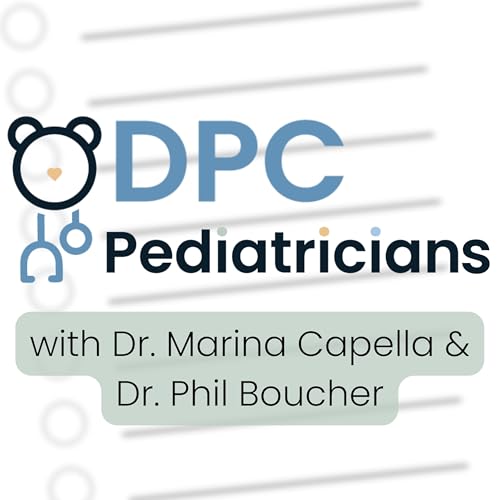
What does "Direct Primary Care" mean for Families?
Artikel konnten nicht hinzugefügt werden
Der Titel konnte nicht zum Warenkorb hinzugefügt werden.
Der Titel konnte nicht zum Merkzettel hinzugefügt werden.
„Von Wunschzettel entfernen“ fehlgeschlagen.
„Podcast folgen“ fehlgeschlagen
„Podcast nicht mehr folgen“ fehlgeschlagen
-
Gesprochen von:
-
Von:
Über diesen Titel
This episode of the DPC Pediatricians Podcast, hosted by Dr. Phil Boucher and Dr. Marina Capella, explores the unique benefits of Pediatric Direct Primary Care (DPC) from the patient's perspective and emphasizes why families embrace the DPC model.
Key Highlights
Text-Based Communication
* Texting the doctor is the most popular feature among millennial and Gen Z parents who dislike phone calls; most pediatric DPC practices offer easy text-based communication.
* Doctors can handle 60-75% of questions (such as rashes, feeding, or daycare return queries) virtually, which saves families from unnecessary office visits.
* Parents appreciate quick reassurance via text, enabling convenience and lowering anxiety — “having a pediatrician in your diaper bag”.
Personalized Relationships and Availability
* DPC pediatricians typically have smaller patient panels and spend more time getting to know each child and family, supporting tailored recommendations and building trust.
* Scheduling systems and automation allow doctors to check in on specific concerns proactively (e.g., scheduled text updates after a sick visit).
* Patients feel valued, are not just “a number,” and rarely experience long waiting times — they have a direct relationship with fewer, familiar providers.
Flexible Access and Team Approach
* In Phil's practice, families can schedule appointments online at any time.
* For coverage, practices introduce substitute pediatricians well in advance to ensure continuity and comfort when the main doctor is unavailable.
* Team members are chosen for their expertise (e.g., asthma or anxiety), and families actively request to see specific providers based on their needs.
Extended Visit Times and Child-Centric Care
* Physicals and sick visits in DPC practices are much longer (up to an hour), allowing thorough discussion and a relaxed environment for both parents and children.
* Doctors discuss family context (work changes, deployments), and adapt care accordingly.
* Visits are child-friendly — playtime and gradual introductions reduce anxiety for toddlers, contrasting with rushed, institutional settings.
Summit Announcement
* Phil and Marina invite listeners to register for the upcoming Pediatric Direct Care Virtual Summit (September 17-19), designed for practitioners at all stages to learn about DPC operations, finances, and marketing. Recordings are available for registrants.
In summary: The DPC model delivers high convenience, direct access, trusted relationships, flexible scheduling, and an anxiety-reducing experience for families and children — key reasons why patients are so satisfied with Pediatric Direct Primary Care.
This is a public episode. If you would like to discuss this with other subscribers or get access to bonus episodes, visit dpcpediatricians.substack.com




